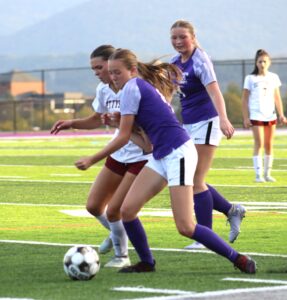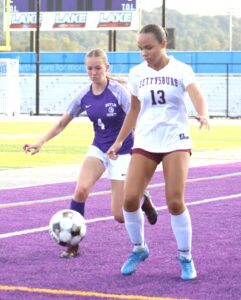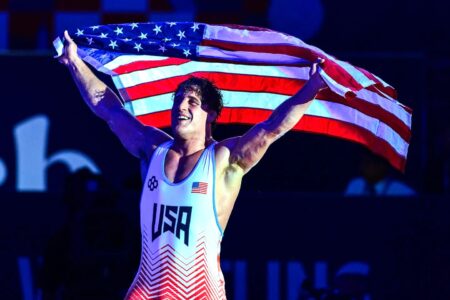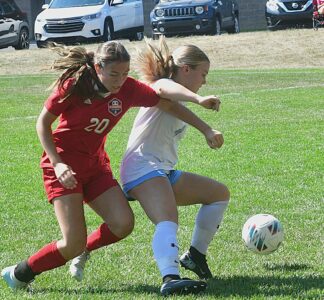Hidlay’s comeback wins world wrestling gold
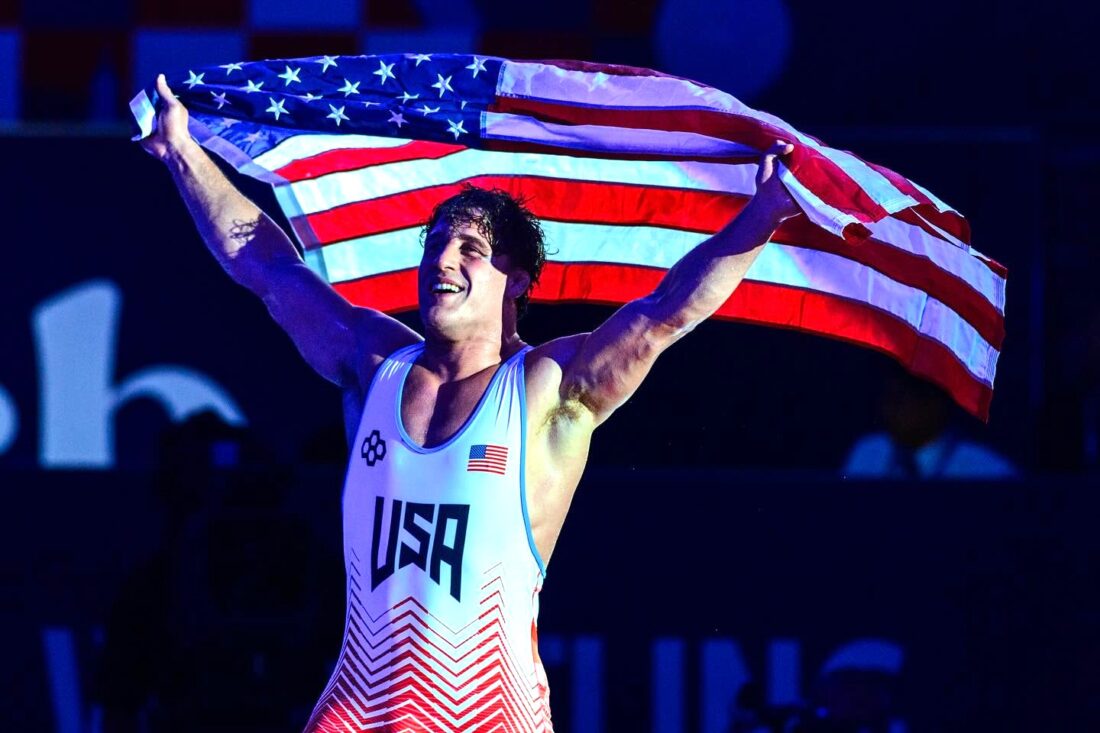
Photo courtesy of Tony Rotundo and USA Wrestling Trent Hidlay holds up the American flag after winning the Worlds at 92kg.
LEWISTOWN — The first thing Trent Hidlay felt on the mat in Zagreb wasn’t the lights or the crowd. It was the grip–an instant, impossible weight–the kind that lets a wrestler know he is in a fight, not a match.
The scoreboard showed 0-0, but already Amanula Gadzhimagomedov, hips low, hands locked around Hidlay’s chest. Four points went up for Russia before most people had found their seats. The cheers from Hidlay’s corner sounded far away, as if they were calling to someone else.
This was the 92kg World Championship final, staged in the heart of Croatia’s capital, a place where history clings to stone and modern ambitions echo off the river. It mattered because no one had ever come from Lewistown, from Mifflin County, and done this. Not here, not on the world stage, not against Russia.
Hidlay’s path was supposed to have ended somewhere along the quiet back roads–a local hero with his name on a wall, a couple of NCAA All-American plaques, and a story parents would tell at high school banquets.
But on Monday, in a city built on old stones and new ambition, the old logic stopped making sense. This wasn’t supposed to happen, and yet it was happening anyway.
Hidlay’s run to Zagreb did not arrive overnight; it followed junior medals, U23 silver, and years of tactical changes.
“I’ve always thought in my career, it’s only a matter of time before I start to figure things out. Just when I felt like I was figuring things out, I would get stopped, and it would force me to add another wrinkle to my game. I think the matches I’m wrestling right now, being able to respond after giving up the first takedown, giving up another takedown, are things I wasn’t able to do in the past. So, not being afraid to mix it up and realize that there are very few humans on this Earth who can go six minutes with me. You’re going to have to kill me out there. I really think that. You’re going to have to take yourself to a dark place to be able to come out on the scoreboard against me.”
Six-zero. Ten-two. Every wrestling parent in Mifflin County knows the look on a kid’s face when the scoreboard turns red. Hidlay had that look–eyes searching, mouth tight, shoulders set against an invisible pressure.
Gadzhimagomedov worked his chest wrap, a move that wins matches in Dagestan gymnasiums and world championships, and each time he locked it, points followed. By the end of the first period, the Russian had racked up ten, Hidlay just two. You could almost feel the air thicken in the corner where Team USA sat.
There’s a moment in every final when the possibility of defeat stops being theoretical and becomes something you can taste. The match could have ended as a lesson in limits, what happens when an American runs into a wall built by a generation of world-class Russians. Instead, it became a story that will echo from the youth wrestling rooms in Lewistown to the crowded kitchen tables across Pennsylvania. Hidlay didn’t break. He bent. He changed.
He started the second period with a calculation. No more doubles, no more high-crotch. He reached for the underhook, the move that made him a high school legend and an NCAA terror and paired it with a sweep single.
One step, two steps, angle, finish. The crowd, sensing a shift, went from background noise to heartbeat. Takedown. Ten-four. There was a flicker in the Russian’s eyes, a hesitation, a calculation of his own. He was gassed. The relentless pressure of Hidlay was taking its toll. Another takedown. Ten-six. For a few seconds, the gym felt like the inside of a train car before it tips off the rails.
Wrestling matches aren’t won in the easy minutes. They’re won when you’re behind and something in your mind refuses to accept what the scoreboard says. Hidlay rode the sweep single, transitioned to the double into a position for exposure–spun, rolled, four points, and the lead.
For the first time, the Russian was behind. Thirteen-ten, with time running off the clock. If you’d drawn it up in a movie, you’d have called it a cliché, but Hidlay didn’t look scripted. He looked exhausted, focused, full of the energy you get only after the rest is gone.
He scored eleven straight points. Every coach in the arena started glancing at their notes, wondering what they’d missed, how a kid from a small town had figured out the puzzle that stumped the continent’s best.
Afterward, Hidlay admitted how close he came to folding: “It was chaotic, man. Just a couple of seconds ago, you’re a challenge away from losing (in) two minutes and kind of getting your (butt) kicked. Just a quick prayer. I said, ‘Give me one more chance. Please give me one more life, and I’ll figure a way out.’ I don’t remember anything that happened in the last four minutes. It hurt bad. It felt really terrible doing it, but never give up, man.”
For the last thirty seconds, Hidlay circled, hands low, eyes up, hearing the voices from his corner but also hearing something older–the echo of shoes on a Mifflin County gym floor, the silent promise made on the way out of town that he’d be more than the next name in a long line of good local wrestlers.
He won with grit, tactics, and mental toughness you can’t teach, only discover. He’d been to the edge. Most would have folded, gone quiet, accepted a silver. Instead, he changed his match and his life.
When it ended, when the whistle blew and the world’s eyes turned to center mat, Hidlay stood there draped in the American flag. Not the kind you buy for the Fourth of July, but the kind you pack for dreams, the flag that belonged to everyone who believed he could do this.
They played the national anthem. Hidlay stood, hand on heart, tears in his eyes. For a moment, he was the only one in the room. The gold medal around his neck, a championship belt around his waist, and the respect of everyone who understood how hard it is to climb out of a ten-point hole. He’d climbed out of deeper ones before, but never with the world watching.
In Lewistown, the news would travel fast. There would be texts, phone calls, and celebrations. All his old coaches would remember the hours, the miles, the moments no one else saw. There would be new dreams now–kids who would believe a little harder, coaches who would point to the mat and say, “Look what’s possible.” Parents would see the match and think of their own long drives, their own quiet hopes. A whole county would look at the medal and see itself.
It started as a match between two wrestlers in the 92kg World Championship final in Zagreb. It ended as a story about a place, about possibility. Trent Hidlay brought a gold medal home from Croatia, but what he really brought back was the idea that someone from here could do something like this. In a world crowded with reminders of what can’t be done, he reminded us, sometimes, the scoreboard lies. Sometimes, it’s what you do after you’re down by eight that matters most.

